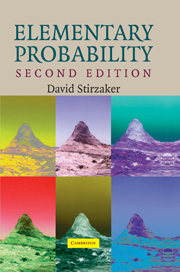Book contents
- Frontmatter
- Contents
- Preface to the Second Edition
- 0 Introduction
- 1 Probability
- 2 Conditional Probability and Independence
- 3 Counting
- 4 Random Variables: Distribution and Expectation
- 5 Random Vectors: Independence and Dependence
- 6 Generating Functions and Their Applications
- 7 Continuous Random Variables
- 8 Jointly Continuous Random Variables
- 9 Markov Chains
- Appendix: Solutions and Hints for Selected Exercises and Problems
- Further Reading
- Index of Notation
- Index
3 - Counting
Published online by Cambridge University Press: 05 September 2012
- Frontmatter
- Contents
- Preface to the Second Edition
- 0 Introduction
- 1 Probability
- 2 Conditional Probability and Independence
- 3 Counting
- 4 Random Variables: Distribution and Expectation
- 5 Random Vectors: Independence and Dependence
- 6 Generating Functions and Their Applications
- 7 Continuous Random Variables
- 8 Jointly Continuous Random Variables
- 9 Markov Chains
- Appendix: Solutions and Hints for Selected Exercises and Problems
- Further Reading
- Index of Notation
- Index
Summary
What I say is, patience, and shuffle the cards.
CervantesThis chapter deals with a special subject and may be omitted on a first reading. Its contents are important and useful, but are not a prerequisite for most of the following chapters.
First Principles
We have seen that many interesting problems in probability can be solved by counting the number of outcomes in an event. Such counting often turns out to also be useful in more general contexts. This chapter sets out some simple methods of dealing with the commonest counting problems.
The basic principles are pleasingly easy and are perfectly illustrated in the following examples.
(1) Principle If I have m garden forks and n fish forks, then I have m+ n forks altogether.
(2) Principle If I have m different knives and n different forks, then there are mn distinct ways of taking a knife and fork.
These principles can be rephrased in general terms involving objects, operations, or symbols and their properties, but the idea is already obvious. The important points are that in (1), the two sets in question are disjoint; that is a fork cannot be both a garden fork and a fish fork. In (2), my choice of knife in no way alters my freedom to choose any fork (and vice versa).
Real problems involve, for example, catching different varieties of fish, drawing various balls from a number of urns, and dealing hands at numerous types of card games. In the standard terminology for such problems, we say that a number n(say) of objects or things are to be divided or distributed into r classes or groups.
Information
- Type
- Chapter
- Information
- Elementary Probability , pp. 83 - 113Publisher: Cambridge University PressPrint publication year: 2003
